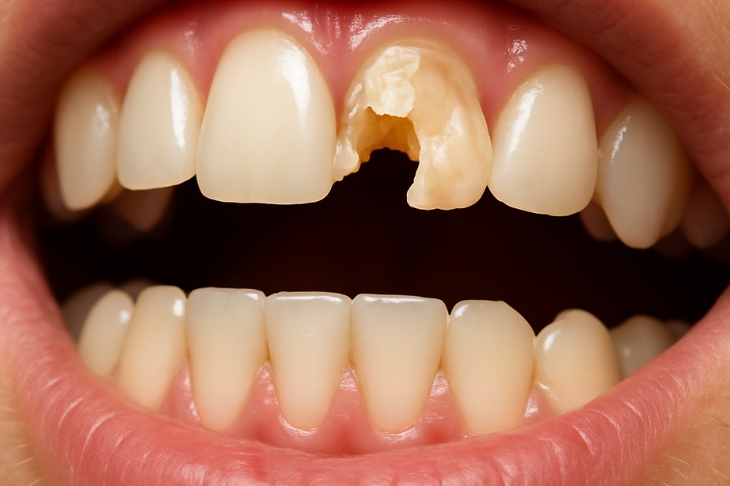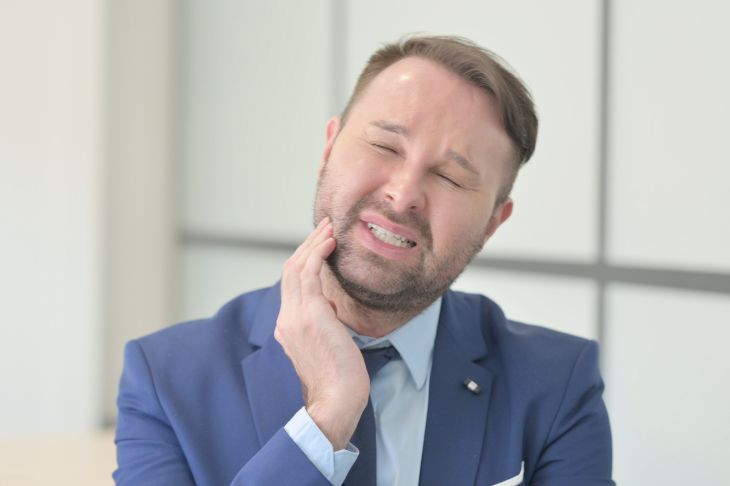
A cracked or chipped tooth might seem like a minor inconvenience, especially if it doesn’t hurt right away. Maybe it’s a small chip from biting down on a hard piece of candy or a fracture from an unexpected fall. You might think, “It’s just a tooth; I’ll deal with it later.” But brushing off a damaged tooth is like ignoring a crack in your car’s windshield—small at first, but it can spread, causing bigger problems. Let’s dive into why you should never ignore a broken tooth and what could happen if you do.
Why a Broken Tooth Is More Than a Cosmetic Issue
A broken tooth isn’t just about aesthetics. Sure, a chipped front tooth might make you shy away from smiling, but the real trouble lies beneath the surface. Your teeth are layered structures—enamel on the outside, dentin in the middle, and a sensitive pulp at the core. When a tooth cracks or chips, it exposes these inner layers, leaving them vulnerable. Bacteria can sneak in, and what starts as a minor chip can spiral into serious dental issues. Ignoring it doesn’t make it go away; it gives the problem time to grow. For example, a small fracture can deepen, reaching the pulp and causing intense pain or infection. Addressing it early saves you from bigger headaches down the road.
Pain and Sensitivity: The First Warning Signs
One of the earliest signs of a broken tooth is discomfort. You might notice a sharp twinge when you sip hot coffee or chew crunchy snacks. This happens because the crack exposes the dentin, which is less protective than enamel. Some people experience only mild sensitivity, tempting them to shrug it off. But that sensitivity can quickly escalate. If the fracture reaches the pulp—where nerves and blood vessels live—pain becomes relentless. You might wince with every bite or struggle to sleep because of a throbbing ache. These symptoms signal that your tooth needs attention, and delaying care only intensifies the discomfort.
Infection: A Silent Threat
Teeth aren’t isolated; they’re gateways to your body. A broken tooth creates an entry point for bacteria, which can lead to infection. When bacteria invade the pulp, they cause inflammation, often resulting in a painful abscess. An abscess is a pocket of pus that forms at the tooth’s root, causing swelling, bad breath, and sometimes fever. If untreated, the infection can spread beyond the tooth, affecting your gums, jawbone, or even entering your bloodstream. This isn’t just a dental issue—it’s a health risk. For instance, a 2019 study found that untreated dental infections contributed to thousands of emergency room visits annually. Acting fast prevents this silent threat from becoming a full-blown crisis.
From Tooth to Body: Systemic Risks
Ignoring a broken tooth doesn’t just jeopardize your smile; it can impact your overall health. If an infection spreads, it may lead to serious conditions like cellulitis (a bacterial skin infection) or, in rare cases, sepsis, a life-threatening response to infection. People with weakened immune systems—such as those with diabetes or heart conditions—are especially at risk. Even healthy individuals aren’t immune. Bacteria from a dental infection can travel to other parts of the body, potentially causing complications in the heart, lungs, or brain. This might sound dramatic, but it’s a reality for those who delay treatment. Your mouth is a gateway, and keeping it healthy protects more than just your teeth.
Damage That Spreads: Cracks Don’t Heal
Unlike a cut on your skin, a broken tooth doesn’t repair itself. Enamel, the hardest substance in your body, can’t regenerate. A small chip might seem stable, but everyday activities like chewing or drinking hot beverages can worsen the damage. A crack can deepen, splitting the tooth or causing it to break apart completely. In some cases, the fracture extends below the gumline, making repair trickier. The longer you wait, the more complex—and costly—the fix becomes. A simple filling might suffice early on, but a neglected tooth could require a root canal, crown, or even extraction. Prompt action keeps the damage contained.
Losing the Tooth Entirely
One of the worst outcomes of ignoring a broken tooth is losing it altogether. If the damage or infection becomes severe, a dentist may have no choice but to extract the tooth. Losing a tooth isn’t just a blow to your confidence; it affects how you eat, speak, and even how your other teeth align. Adjacent teeth may shift into the gap, leading to bite issues or further damage. Replacing a lost tooth with an implant or bridge is often expensive and invasive. By addressing a broken tooth early, you increase the chances of saving it, avoiding the hassle and cost of replacement.
Financial Sting: The Cost of Delay
Let’s talk money. Fixing a chipped tooth early might cost you a few hundred dollars for a filling or bonding. But if you ignore it, the price tag skyrockets. A root canal and crown can run thousands, and that’s before factoring in antibiotics for infections or surgery for abscesses. If the tooth is beyond saving, you’re looking at implants or bridges, which can cost even more. Dental insurance often covers only a portion of these procedures, leaving you with hefty out-of-pocket expenses. Investing in timely care is like fixing a leaky pipe before it floods your house—it’s cheaper and less stressful in the long run.
Emotional and Social Toll
A broken tooth doesn’t just hurt your wallet or health; it can dent your confidence. If the damage is visible, you might feel self-conscious about smiling or speaking. This can strain social interactions, from casual chats to professional settings. People often underestimate how much oral health affects mental well-being. Feeling embarrassed about your teeth can make you withdraw, avoid photos, or skip social events. Over time, this takes a toll. Fixing a broken tooth restores not just your smile but also your ability to engage with the world confidently.
When to Seek Help: Don’t Wait for Pain
If you’ve chipped or cracked a tooth, don’t wait for it to “feel” serious. Pain isn’t always immediate, but damage starts right away. Schedule a dental visit as soon as possible to assess the injury. A dentist can use X-rays to check for hidden fractures or pulp exposure. They might recommend bonding, a filling, or a crown, depending on the severity. Even if the chip seems minor, a professional evaluation ensures it won’t worsen. Acting quickly limits complications and preserves your tooth’s structure.
Some signs demand urgent attention: severe pain, swelling, fever, or a bad taste in your mouth. These suggest infection or an abscess, and waiting could make things worse. In Katy, finding an Emergency Dentist in Katy can make all the difference, offering prompt care to address urgent issues before they escalate. Don’t let fear or busy schedules stop you—your health is worth it.
Prevention: Protecting Your Teeth Moving Forward
Once you’ve dealt with a broken tooth, you’ll want to avoid a repeat. Simple habits can protect your smile. Avoid chewing hard items like ice, popcorn kernels, or pen caps. If you play sports, wear a mouthguard to shield your teeth from impact. Grinding your teeth at night? Ask your dentist about a nightguard. Regular dental checkups catch small issues before they become big ones. Brushing twice a day and flossing keep your teeth strong and less prone to damage. These steps aren’t just about avoiding broken teeth—they’re about keeping your smile healthy for years to come.


